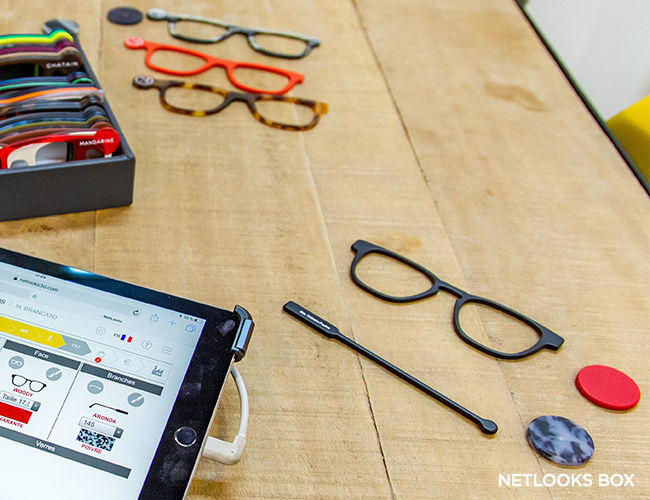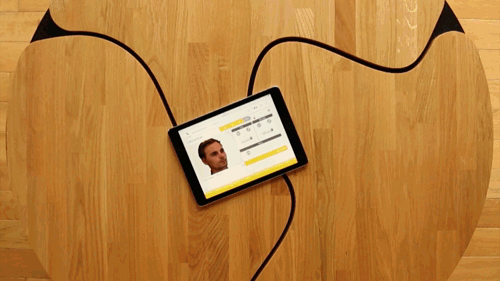Paris-headquartred service bureau Sculpteo has confirmed a new 3D printing collaboration with Netlooks, a specialist in handmade eyewear also based in France. Together the two companies applied 3D printing to produce eyewear test frames that can fit to a customer’s profile through a multitude of part combinations. These test frames are used as a “fitting step” to allow customers to try on and adjust frames to suit the style and comfort.
According to Clément Moreau, CEO and co-founder of Sculpteo, “People that wear eyeglasses often struggle to get the right fit. 3D printing allows customers to try frames, adjust the product and change their mind, just as luxury jewelry makers make you test a ring in wax before manufacturing it.”
“The technology is cheap, fast, and accurate. It demonstrates that not only high-end technology can help artisans but in addition it makes possible better products for end users.”

Three steps to custom, handmade, artisanal eyewear
Netlooks is a startup based in Nancy, with concept stores in France, Belgium and Canada. Its frames are also available at various independent opticians in France. The company was created with the goal of manufacturing “handcrafted, bespoke frames that are entirely customizable, from engravings, colors, branch and face shapes, style, to just about any texture.”
To achieve this, the company employs a three-step process for its customers. First, the desired eyewear model is chosen. Next, Netlooks scans the features of the customer’s face to find the fit, and they are invited to try on a test model. Then, in the final step, the the company delivers a final, handmade pair of glasses fitted to their exact morphology.
This process has proved time consuming and costly for the company, with more than 200 testing models required by each store that wanted to sell its frames. When handling its three-step process in-house, this demand would have reportedly involved over 1,000 hours of work from a dozen of craftsmen working for Netlooks. In order to overcome the overwhelming demand for test models, Netlooks partnered with Sculpteo to 3D print them instead, as opposed to handling them in-house.

3D printing cuts manual labor
The 3D printed models from Sculpteo help Netlook to check the morphological measures as well as the comfort of each part of the frame for the customer by customizing the face, bridge and arm sizes using interchangeable pieces. The test frames are 3D printed in Nylon PA12 using SLS technology, due to its post-processing properties that equip the models with a high-quality finishing.
“We are at a moment in the eyewear industry when we have to do something unexpected. We are at a crossroads of technology and craftsmanship,” comments Pierre Andrieu, founder of Netlooks.
“Sculpteo’s 3D printing technology enabled us to achieve the degree of accuracy needed to rapidly create any type of frames, at a low price, with perfect fit – while maintaining the green approach we care so much about. Together, we’re pushing the eyewear to a reality until now only opened to the luxury industry.”
Looking into the future of eyewear with 3D printing
With several 3D printed eyewear brands and partnerships launching in the past few years, Andrieu may be right in his statement that the industry is “at a crossroads of technology and craftsmanship.”
In 2018 MOREL, a French eyewear brand, and INITIAL, a Seynod-based 3D printing service bureau, launched a range of glasses with 3D printed frames.

Elsewhere, EYE-DNA, an optical solutions company based in Hong Kong, launched an interactive virtual kiosk called 3DNA Eyewear System. The kiosk integrates 3D scanning and design to provide user designed and precisely fit eyewear.
Luxexcel is a company that specializes in 3D printing ophthalmic lenses, which recently advanced from the pilot phase of its technology to the printing of commercial lenses. The company’s lenses have also been nominated for Consumer Product of the year in the 2019 3D Printing Industry Awards.
In 2018, a collaboration between Yuniku eyewear, HOYA & Materialise took home the award for 3D Scanning Application of the Year.
Make your decision for the Consumer Product of the Year and more in the 2019 3D Printing Industry Awards.
Subscribe to the 3D Printing Industry newsletter for the latest news in additive manufacturing. You can also keep connected by following us on Twitter and liking us on Facebook. Looking for a career in additive manufacturing? Visit 3D Printing Jobs for a selection of roles in the industry.
Featured image shows bespoke eyewear from Netlooks. Photo via Netlooks


